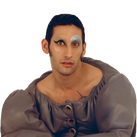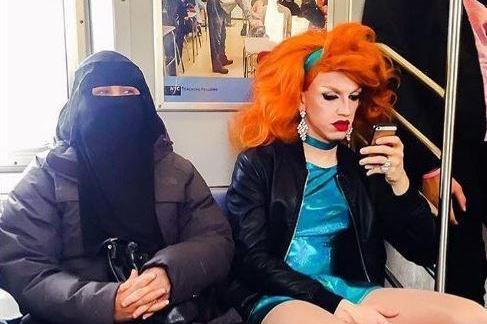As a drag queen who was raised Muslim I'm a right-wing meme maker's worst nightmare
Just like the meme, I’ve been sat next to women in burkas when travelling around London in drag, and here are the comments I’ve received about my kind: ‘I love your nail polish.’ ‘Where can I come see you perform?’ ‘You look beautiful habibi, can I follow you on Instagram’


Your support helps us to tell the story
From reproductive rights to climate change to Big Tech, The Independent is on the ground when the story is developing. Whether it's investigating the financials of Elon Musk's pro-Trump PAC or producing our latest documentary, 'The A Word', which shines a light on the American women fighting for reproductive rights, we know how important it is to parse out the facts from the messaging.
At such a critical moment in US history, we need reporters on the ground. Your donation allows us to keep sending journalists to speak to both sides of the story.
The Independent is trusted by Americans across the entire political spectrum. And unlike many other quality news outlets, we choose not to lock Americans out of our reporting and analysis with paywalls. We believe quality journalism should be available to everyone, paid for by those who can afford it.
Your support makes all the difference.A Muslim woman in a Niqab sat next to a legs-splayed drag queen on a train: this was the recently viral meme that looked like a film poster to a re-imagined Harold & Maude. As I’m a drag performer myself – and was also raised Muslim – it felt like my soul had been expunged and split in two onto the photograph.
Whilst the image is comic for juxtaposing two stereotypically “conflicting” identities, its web popularity points to a profound social issue. Namely, how Western secularism has been pitted against Islam, which is positioned as culturally regressive.
Take the words of Marine Le Pen: “Islamic fundamentalism is aiming, through politico-religious organisations, to impose Sharia laws instead of our countries’ laws, in place of our values... and our ways of life.”
That progressive attitudes and the Islamic faith might be harmonious is a notion many find unconscionable. I often write about my intersectional identity – being gay and Arab, being Iraqi-Egyptian and British, being raised Muslim and being gender-queer. And I’ve been sent the following comments in response: “I don’t get it. One minute you’re Arab, the next your British. PICK A SIDE” and, “just be thankful your [sic] tolerated here in the UK, or go back to your Muslims where your kind are killed.”
Like in the meme, I’ve found myself sat next to women in burkas when travelling around London in drag, and here are the comments I’ve received about “my kind”: “I love your nail polish.” “Where can I come see you perform?” “You look beautiful habibi, can I follow you on Instagram?” “My husband would find you sexy.” Hardly the threats to my freedom populist rhetoric would have you believe.
I don’t mean to pretend that homophobia doesn’t occur in pockets of the Middle East – though it exists all over the world – but it’s absurd to homogenise all Arab identities as regressive. For instance, a lot of what I’ve learned about drag performing has come from my Middle Eastern upbringing. For instance, the familial collectivity of Iraqi Culture has informed the way I look after my drag family; the emotional quality to Arab culture is where my love of performance comes from, and the constant open-door generosity of Egyptian society – no matter your financial status – is at the route of my queer politics.
Western media has coded Middle-Eastern culture as implicitly violent, and this has robbed Islam of some inherently progressive principles. The Qu'ran, for instance, is one of the only religious texts that deem women and men as completely equal. In fact, Muslims were among the first to give voting and legal rights to women. Furthermore, the imagining of hijabs as usurping female privilege discounts them as a choice many Muslim women make with agency. In some cases, it is a feminist statement critiquing the West’s obsession with female perfection. But Islamophobia has erased the intersectional identities included in the faith of 1.6 billion people. Organisations such as Islam and Feminism are fighting to change this.
Make-up artist Umber Ghauri, 27, who identifies as pansexual, agender and Muslim, explains the inherently queer nature to some Muslim practice: “My grandfather is of Syrian heritage and is Sufi, and of course Sufis have male spaces where they wear skirts and spin and dance in praise of Allah. They use their bodies to bring them to a place of transcendence where they feel a soul connection with Allah, both within and beyond the body. I find that very queer.”
Western Populism persuades that Muslim identities are the source of social injustice; but it is the supremacy of Western ideology that fuels religious separatism. We all have an urgent responsibility to collectively re-frame our perspectives on Islam.
I don’t assume that every white person is a member of the KKK and in return, I ask you don’t affiliate me with Isis. The only Isis I have ties with is that of the Ancient Egyptian Goddess, whose majesty I’ll be channelling in my drag show this Sunday.
Join our commenting forum
Join thought-provoking conversations, follow other Independent readers and see their replies
0Comments